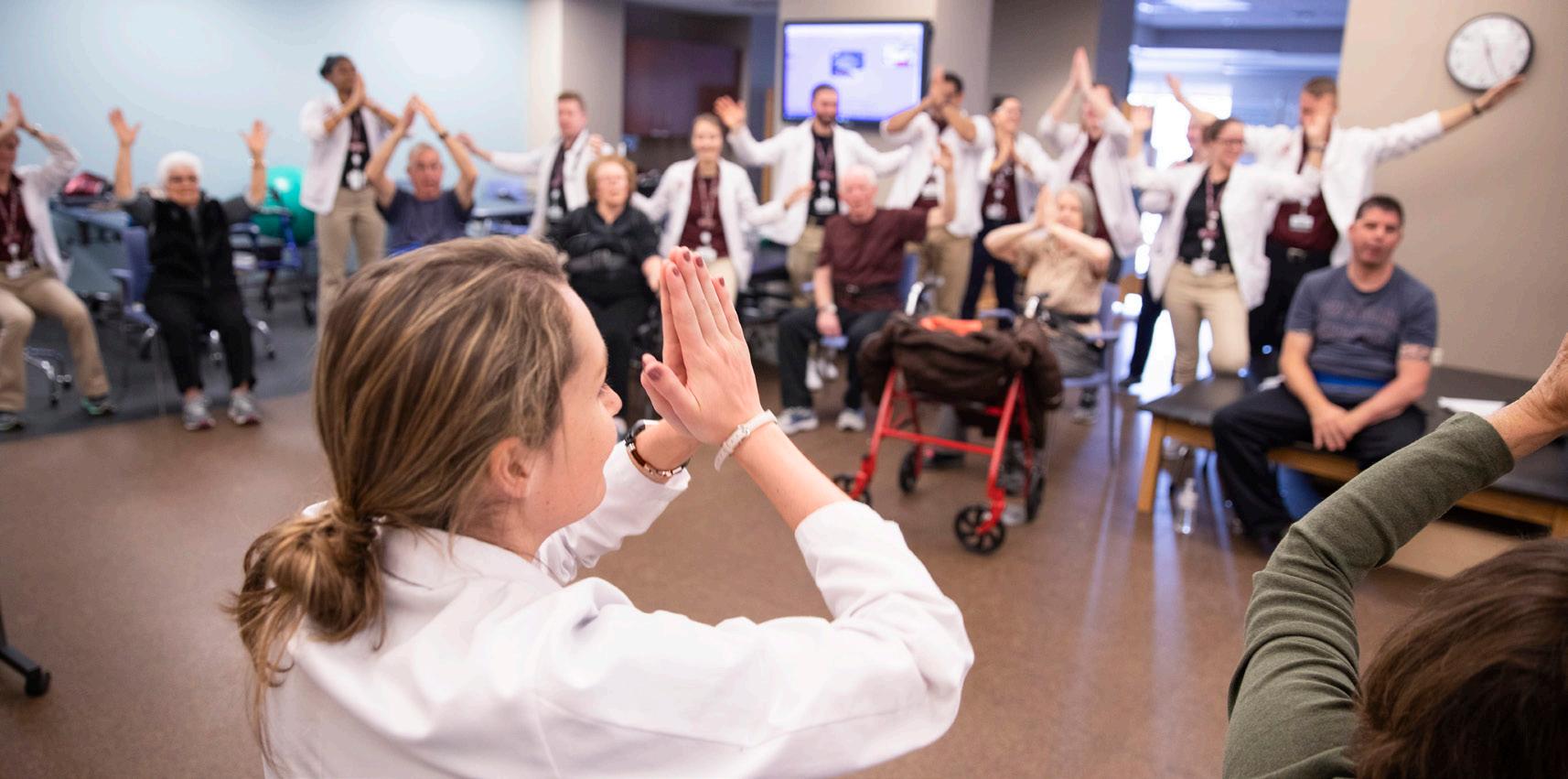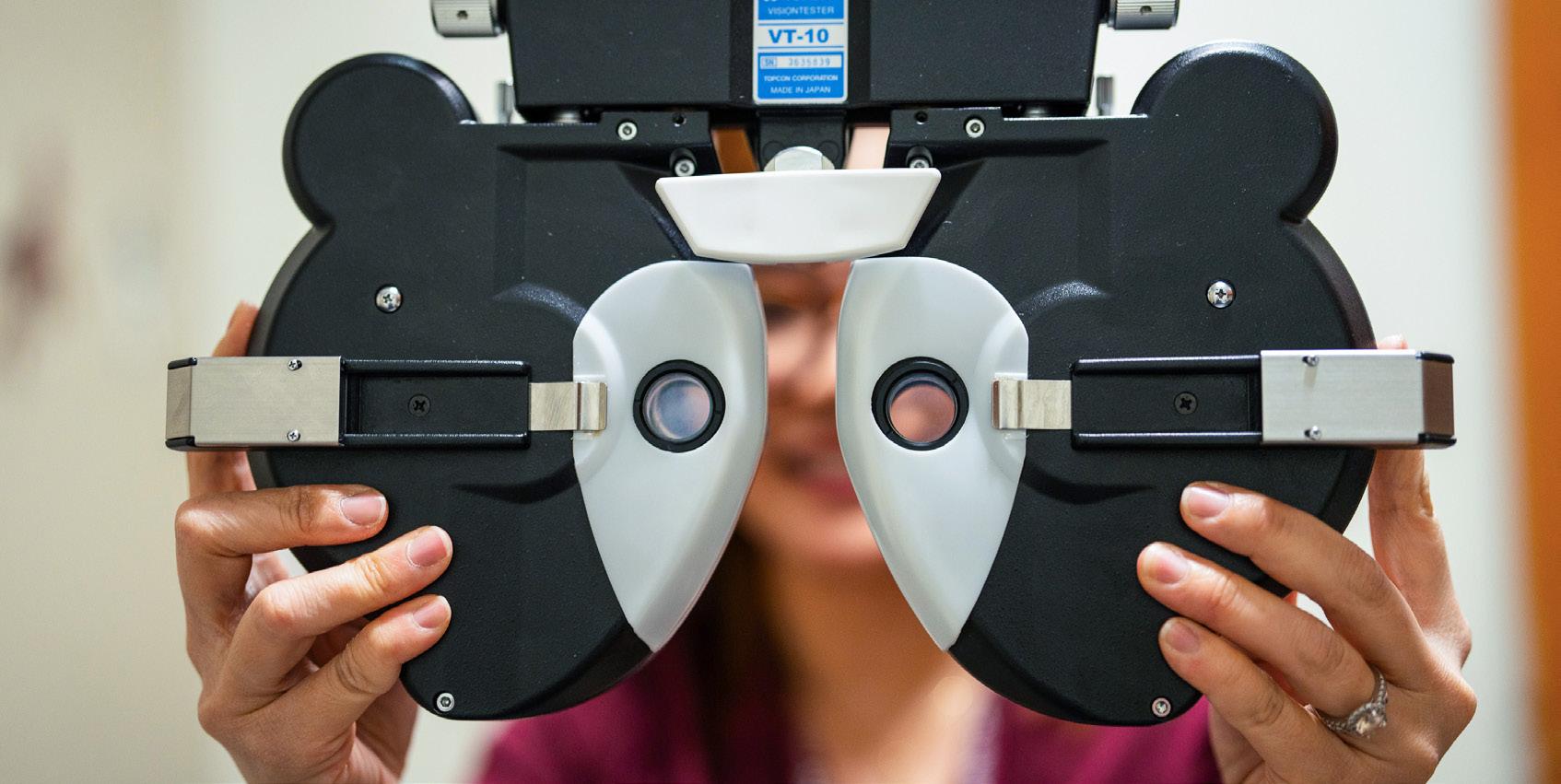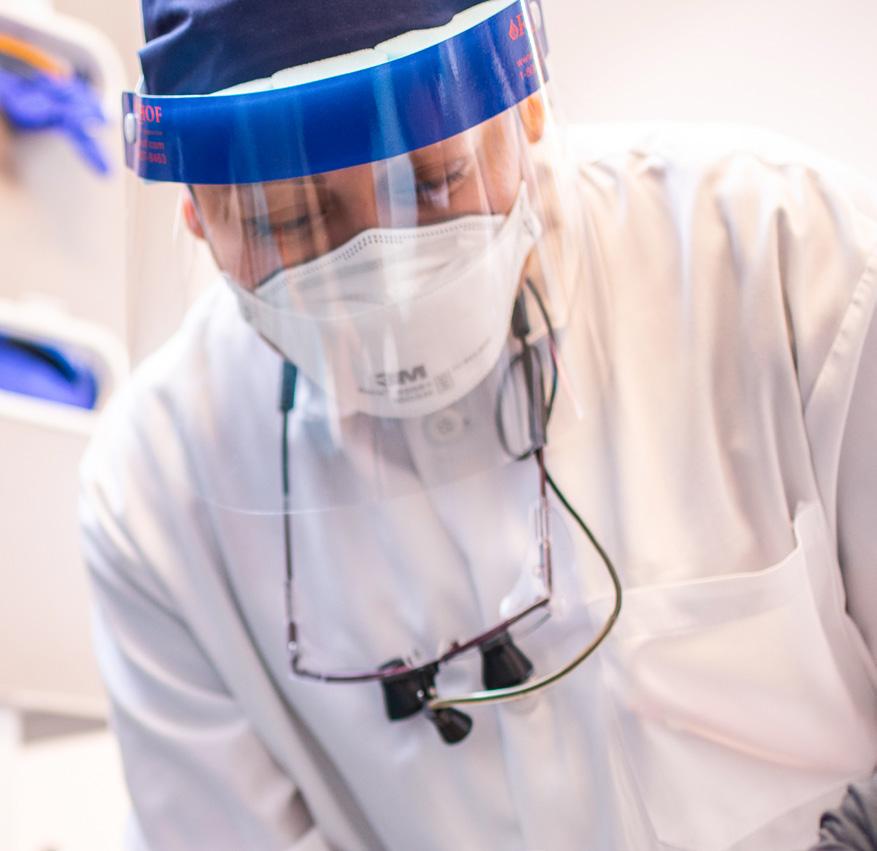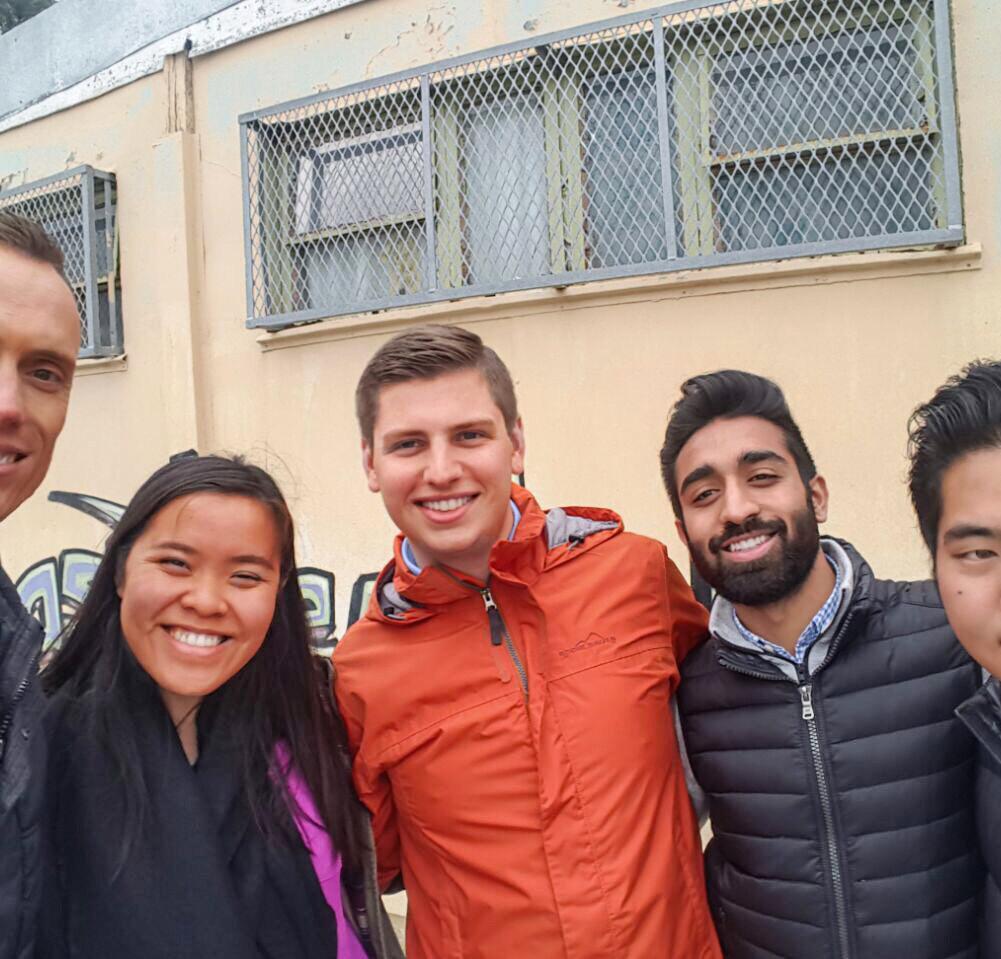Experiencing the world of healthcare
Preparing career-ready graduates through immersive real-world education

Internships and research p. 4


Preparing career-ready graduates through immersive real-world education

Internships and research p. 4

“I’ve grown from someone who didn’t know anything about dentistry to feeling very capable of providing competent preventative care for patients, thanks to the instructors and professors who guided me every step of the way.”
At the Massachusetts College of Pharmacy and Health Sciences (MCPHS), real-world experiences aren’t an afterthought—they are deeply embedded into our education model for all students, from first-year undergraduates to postgraduate residents and fellows. As a global leader in educating the next generation of the health and life sciences workforce, MCPHS uses internships, research assistantships, field placements, emerging technologies and tools, and a multidisciplinary approach to give students a springboard to the future—whatever it holds.
Real-world experiences begin here on Day 1, enabling MCPHS students to
apply the hard skills they learn in our Boston, Manchester, Worcester, and virtual classrooms, and to build the soft skills they need to excel in their future careers. Overseen with close mentorship by our expert faculty, who share a singular commitment to student success, the experiential opportunities at MCPHS represent our core grounding in the health and life sciences: Every experience is meant to boost both the confidence and the résumés of our students, bringing them a step closer to vital roles in the healthcare workforce.
With an institutional history spanning two centuries and a prime
location at the global center of healthcare and biotechnology in Boston and New England more broadly, MCPHS has curated a sophisticated and robust network of clinical and research partnerships. These long-standing affiliations with world-class medical centers and healthcare companies offer our students an unmatched competitive advantage. It’s not unusual to find an MCPHS student spending the morning in an advanced pharmacology class and the afternoon conducting groundbreaking pharmaceutical research at the DanaFarber Cancer Institute.
10,000
post-fellowship job placement
100+ academic programs across dozens of health sciences fields
10,000 100% 100+ 100%
10,000 clinical internships, research assistantships, and field placements each year
With internship opportunities at more than 180 health and life sciences institutions and companies, a host of on-campus and external research opportunities, and a diverse menu of volunteer experiences, MCPHS students build impressive experiential portfolios based on their individual goals and aligned with healthcare workforce needs.
A student pursuing a career in cancer research, for instance, might volunteer with a nonprofit organization and work several days a week in a research internship at Brigham and Women’s Hospital, all under the mentorship of an MCPHS faculty member.
At MCPHS, our laser focus on health sciences and our partnerships with top-notch institutions ensure that every opportunity is a meaningful steppingstone on the path to your dream career. Every student is different, so every educational path is unique, rich in the right experiences.

OLEKSANDRA BONDARENKO, BS ‘25
Charting a career in research with tenacity
Oleksandra Bondarenko, BS ’25, chose MCPHS for her undergraduate studies— and first time living in the United States— due in large part to its Boston location. Bondarenko’s family history of cancer led her to research and a BS in chemistry program. With help from a professor, she emailed research investigators in the area until she landed an internship at Dana-Farber Cancer Institute.
In the lab, Bondarenko has built on the fundamental knowledge of techniques she learned in class. “It took me a couple of tries to nail the Western blotting technique, which is really useful on a daily basis if you are working on identifying proteins,” she said. “You have to actually understand how it works.”
Work at Dana-Farber—including helpful tips and mentorship from her Harvard graduate student leader—has helped refine Bondarenko’s career plans. “I know that I don’t want to work with patients. And I need constant career growth,” she said. A referral from a DanaFarber colleague helped her land her next step—a summer research position in New York City. She hopes her research paper will publish soon, and has started considering PhD programs for biochemistry—all in preparation for synthetic research in a pharmaceutical setting.
Bondarenko’s advice to those building their scientific knowledge? “Go to career fairs. Go to medical lectures,” she said. “Find all the different ways to learn and build connections.”
Desiree Irungu, Bachelor of Science in Medical and Molecular Biology and minor in Health Psychology ’24, has roots in Kenya and often takes trips back to her community, which have helped solidify her desire to work as a doctor—particularly with Doctors Without Borders. The realities of healthcare access disparities are vivid for Irungu. “Not just in Kenya, but in other underserved communities around the globe, I would love to be that person who can provide adequate healthcare for all regardless of their socioeconomic status,” she said.
A chance encounter at Brigham and Women’s during a doctor’s appointment led to a transformative rheumatology internship at the Boston hospital, where she worked on fibrotic cells present in rheumatoid arthritis.
“You think you know something until you’re out there in the world actually practicing it,” Irungu said. “MCPHS gave me the background knowledge, but actually participating in the Wei lab was where I was able to learn lifelong skills, which was really exciting.” She’s learned lab techniques and delved into 10x Genomics, and is now considering a possible asthma and allergy specialization.
Irungu’s research investigators, who serve as mentors, have offered insight into how physicians divide their time between patients and research. In addition, Irungu founded the MCPHS chapter of MEDLIFE (Medicine, Education, and Development for Low-Income Families Everywhere), a global nonprofit that works with underserved communities in Latin America and Africa.
“For a lot of pre-health students, the goal is to make an impact, but a lot of times we can’t do that because we’re not yet established healthcare providers. I decided to partner with MEDLIFE because even as students, we can make a change in a person’s health,” Irungu said. She’ll soon lead a MEDLIFE trip to Peru for a cross-disciplinary group of students interested in global medicine.
For others looking to grow, explore, and make an impact now, Irungu advises openness. “Don’t be afraid to share your story. It can be the very thing that leads to your next opportunity,” she said.


RECENT INTERNSHIP, RESEARCH, AND VOLUNTEER PLACEMENTS INCLUDE:
Harvard Medical School
Vertex Pharmaceuticals
Charles River Laboratories
Beth Israel Deaconess Medical Center
Boston Children’s Hospital
Dana-Farber Cancer Institute
Florida Department of Health
Shriners Children’s Philadephia
U.S. Food and Drug Administration


MCPHS provides a comprehensive academic environment that encompasses interprofessional practice, education, scholarship/research, and service




A champion of interprofessional practice and education (IPE) for more than two decades, MCPHS has made an institutional commitment to advance the next generation of collaborative healthcare leaders. All of our schools participate in the Center for Interprofessional Practice and Education—one of seven Centers for Excellence at MCPHS—enabling our students in more than 100 programs to learn with, from, and about each other to enable effective team-based collaboration and improve health outcomes.
Our tiered approach to IPE begins with a strong foundation in healthcare roles and patient care responsibilities before building to advanced topics, such as treating opioid use disorders as an interdisciplinary team, exploring combined PT and acupuncture approaches to low back pain, or the collaboration with Harvard School of Dental Medicine and PharmD students to provide care to

older adults at their homes in underserved communities. Students gain hands-on experience collaborating with a diverse workforce of healthcare professionals, including clinicians in training, such as nurses, physician assistants, occupational therapists, and imaging technicians, as well as system administrators, data scientists, and other key players. Both students and faculty participate in large events with standardized patient actors to practice person-centered, team-based care. Through IPE, MCPHS students develop and demonstrate the nationally approved set of interprofessional competencies, and hone the soft skills they need to thrive in today’s rapidly evolving healthcare system. Our graduates enter the workforce with an edge in collaboration and communication and a fine-tuned understanding of their place in the healthcare team.
IPE allows students to work collaboratively across professions as they learn to contribute to interprofessional teams to achieve better health outcomes and experiences for patients, communities, and the healthcare workforce


At MCPHS, we’re at the forefront of technological innovations in healthcare
Our students access the latest technology both on our campuses and in the labs and facilities of our world-class clinical and STEMfocused corporate partners. We know that hands-on experience with state-of-the-art virtual reality, augmented reality, and simulation tools is integral to building real-world skills.
Our approach to technology prepares students to confidently enter their patient interactions in conjunction with classroom instruction and hands-on experiences. Optometry students use a virtual reality program to practice conducting complex eye exams. Occupational therapy students employ virtual reality equipment like headsets to improve range of motion and strength through gaming. Students use simulation technology to study the differences between normal anatomy and abnormal gynecological and obstetrical pathologies—some that are so rare it would take years to encounter them in real-life patients. When they finally do, these MCPHS-trained clinicians will be ready.
Thanks to these and many other technological assets, MCPHS students enter their patient interactions and clinical rotations with an edge over their peers—a competitive advantage that follows them into the workforce.


LOGAN STEVENS, MS ‘24
As a student in the Master of Science in Occupational Therapy program on the MCPHS campus in Manchester, Logan Stevens was part of a research team that published a study investigating virtual reality (VR) headsets with exercise programs installed as a tool for patient rehabilitation.
“I hadn’t thought of virtual reality as a mode of therapy until I started at MCPHS,” they said. As Stevens spent more time using the program themself and teaching their peers to use it safely, they gained further expertise.
Stevens also learned how to use a 3D printer to print innovative, accessible devices to improve quality of life for patients with limited mobility. “My peers and I worked on designing a splint for an individual with a nerve injury,” Stevens said. “We heard recently that she was able to use it to use the rowing machine at the gym, something she hasn’t been able to do in 10 years.”
At their current rotation at the Monarch School of New England, Stevens built a 3D printing database that contains models for devices such as cup holders for wheelchairs, pencil grips, and more.
“I’ve had a lot of opportunities to learn and observe, and also apply so much of my knowledge,” they said.

When your health sciences program has an illustrious 200-year history at the center of the medical universe, you have access to a sought-after list of clinical experiences.
MCPHS students participate in thousands of clinical rotations every year—from the Acupuncture Treatment Center on our Worcester campus to renowned partner institutions, including major hospital systems, nursing facilities, oncology centers, public agencies, and rehabilitation facilities across the United States and the world.
With so many clinical experiences to choose from, MCPHS students can always find opportunities to suit their individual goals. Yale New Haven Health, for instance, partners with MCPHS to offer longitudinal rotations, in which students complete multiple rotations at the same health system to gain a higher level of institutional proficiency. Deep faculty networks help build new placements and opportunities all the time.
A universe of clinical experiences
10,000 clinical internships, research assistantships, and field placements each year
4,700+ affiliation agreements
2,800 clinical sites in the past three years
45 U.S. states and territory placements over the past five years
13 country placements over the past five years
Residencies and fellowships offer healthsciences graduates an unparalleled opportunity to gain specialized training and real-life experience in their chosen fields. MCPHS offers robust pharmaceutical residency and fellowship programs and lays the groundwork for optometrists to pursue postgraduate education.
MCPHS has the second-largest pharmaceutical fellowship program in the country. Along with traditional and academic-focused fellowships, MCPHS offers biopharmaceutical fellowships with partner companies, including Pfizer, Novartis, and Sanofi. This in-depth, specialized training with industry leaders means that our pharmacy fellows graduate with high-level job offers, such as senior manager or associate director, in hand.
MCPHS pharmacy residents get unmatched training at premier health systems, such as Beth Israel Lahey
Health and Atrius Health, and topnotch pharmacies, such as CVS and Walgreens, from the earliest days of their career. The world-renowned status of these partner institutions means our residents experience the most complex patient cases and work at the forefront of pharmaceutical research.
As for our optometry graduates, more than 70% of those who apply to residencies find placements. That’s because preparing students for residency is part of our culture. MCPHS optometry students start seeing patients in our Eye and Vision Center and diverse community clinics earlier than their peers in other programs—in the fall of their second year. This real-world experience has landed MCPHS graduates residency placements in Veterans Affairs hospitals, community health centers, and other institutions across the country.


Anisha Pola brought her longtime interest in biology to her undergraduate degree, then to work in market research, and later to her PharmD degree. She chose MCPHS for her fellowship in pharmacovigilance at Takeda, where she now works full time.
“For a long time, I thought that being a pharmacist meant I could do either retail or hospital,” she said. “But providing perspective from a pharmacist’s point of view in industry before the drug is even born, that brings incredible insight. And I got to retain the clinical knowledge and apply what I learned in pharmacy school.”
She chose MCPHS’s fellowship program for its size, the chance to enter as an adjunct faculty member, the 100% job placement rate, and the location.
“Boston is exciting,” she said. “It’s easy to be engulfed in the atmosphere of innovation.”
As a pharmacovigilance scientist, Pola is responsible for monitoring, assessing, and reporting adverse drug reactions and safety concerns to ensure patient safety and regulatory compliance.
“Going through the fellowship at MCPHS helped me to develop a robust professional network and reinforced my decision in becoming an industry pharmacist,” Pola said. “It’s a very evolving profession, and that’s what I love about it so much.”
Today’s greatest healthcare challenges are global—and it will take multidisciplinary collaboration across international borders to solve them


The next generation of health sciences leaders needs the globally minded, real-world training that brings deeper cultural understanding and partnership across countries and healthcare systems.
Along with strong, long-standing partnerships with the world’s most renowned educational institutions, including Peking University Health Science Center—the Harvard of China—and the University of Paris Cité, MCPHS students can choose from a menu of global healthcare experiences to find the program that’s a fit for their goals.


INTERNATIONAL TRAVEL COURSES
Global Perspectives in Nuclear Medicine, for instance, includes a visit to the OPAL reactor in Sydney, Australia, one of only eight sites in the world that produces medical isotopes.
Supervised clerkships and rotations in international locations including Cape Coast, Ghana; Rurrenabaque, Bolivia; San Ignacio, Belize; Zurich, Switzerland; Cape Town, South Africa; Seoul, South Korea; and more.
STUDENT EXCHANGE
MCPHS students travel to Japan to spend time at the Kyoto Pharmaceutical University.
SERVICE-LEARNING OPPORTUNITIES
These faculty-led programs, open to students from all disciplines during school breaks, offer a two-week immersion into global healthcare in countries including Morocco and Peru.



Thomas Laudone, PharmD ’18, remembers one particular day of his pharmacy rotation in Cape Town, South Africa: “It was 100 degrees, we were busy all day, and I was on my feet directing patients for counseling, prescribing alternate meds,” he said. “Later, a nurse said, ‘Wow, you stayed really calm throughout all of that.’ That’s when I realized I wanted to work in emergency medicine.”
Laudone chose South Africa to work with underserved populations and was the first MCPHS student to work in the pediatrics ward there. “I wanted a true learning experience,” he said. The challenges of fewer resources sparked many essential moments of creativity, problem-solving, and relationship-building.
“There were so many times where the textbook option just wasn’t available,” he said, such as a specific antibiotic. “The level of critical thinking and being able to adapt with the resources you have is hard to teach in the classroom.”
Laudone’s international experiences resonate today in his work as a pediatric emergency room pharmacist at the University of Maryland Medical Center. “One of the most transferable skills was that I had to build rapport and trust in setting up services in these countries,” Laudone said. “Here I came on to a unit that had never had a pharmacist. If it wasn’t for my global health experiences, I probably would not have been as successful.”
He also honed his teaching skills abroad, precepting classes in South Africa and later Malawi. Afterward, Laudone published several papers with his MCPHS faculty advisor on social accountability: aligning local health education with healthcare systems to build a sustainable infrastructure.
“Every healthcare professional should have to do an international rotation,” he said. “It just completely changes your perspective on healthcare and how much we have in the United States.”


HILDA AGYAPONG, MPAS ’24
When she was 17 years old, Hilda Agyapong, MPAS ’24, moved to Connecticut from Ghana with plans to become a cartoonist. She was finishing her high school diploma when she took her first anatomy class. “I’m one of those people that medicine just called,” Agyapong said.

In her final year of her three-year program, Agyapong returned to Ghana for the first time to complete a four-week clinical rotation at Cape Coast Teaching Hospital, two hours from where she grew up. She was eager to learn more about healthcare in Ghana. It brought more challenges than she expected, from a lack of basic supplies like gloves and hand sanitizer to cultural norms that prevent people from seeking care. She described it as difficult but rewarding.
“It’s been a hands-on experience, and I get to care for patients and perform procedures,” she said. “I may not have had that kind of opportunity in other rotations.”
This was only Agyapong’s second time returning to Ghana since she moved to the United States. After her rotation ended, she extended her trip to spend quality time with family she hadn’t seen in over a decade.



When you join the MCPHS Community, you’re gaining access to today’s health and life sciences leaders—mentors who value your dreams and have the keys to making those dreams a reality. Our institutional partnerships with worldclass academic centers, health systems, research institutions and other companies, and our carefully refined educational offerings, ensure our students can chart a direct course from MCPHS to their dream healthcare jobs, often before graduation.
Doors open for you when you’re part of the deep and wide network of MCPHS students, faculty, and alumni that spans 200 years and circles the globe. These doors first lead to top-notch internships, research assistantships, clinical rotations, international volunteer opportunities, postgraduate residencies and fellowships, and countless other real-world experiences. Those, in turn, give way to health and life sciences careers that are not only fulfilling, but impactful and inspiring.